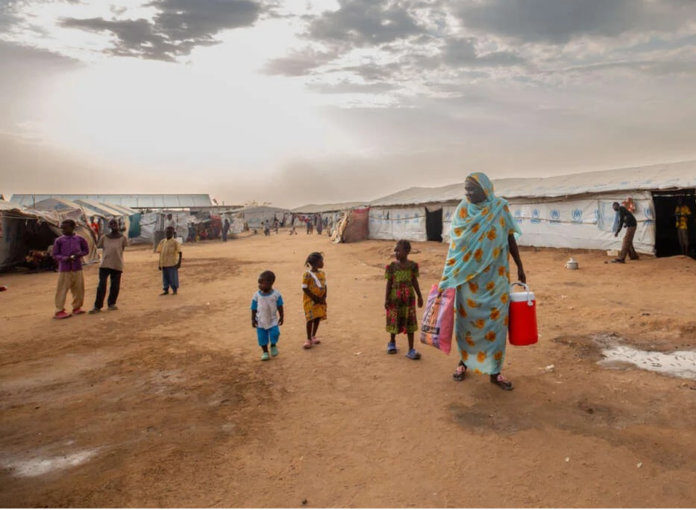Sudan tops the IRC’s 2024 Watchlist, a list of countries most likely to experience a deteriorating humanitarian crisis. The escalating conflict, mass displacement, economic collapse, and healthcare crisis have plunged Sudan into a dire situation. Here’s a detailed overview of the crisis and how you can help.
At a Glance
- Over 10 million people internally displaced since April 2023 (of 12 million total IDPs).
- Over 2 million refugees have fled to neighboring countries since April 2023.
- Over half of the population (25 million people) are in need of humanitarian aid.
- 222,000 children could die of malnutrition in the coming months, according to the U.N.
The Conflict
The power struggle between the Sudanese Armed Forces (SAF) and the Rapid Support Forces (RSF) erupted into a large-scale conflict in April 2023. Conservative estimates say the conflict has killed at least 15,500 people, while some estimates are as high as 150,000.
Before the conflict, Sudan was already experiencing a severe humanitarian crisis. Long-term political instability and economic pressures meant that 15.8 million people were in need of humanitarian aid. The conflict has only exacerbated these conditions, leaving almost 25 million people — more than half of Sudan’s population — in need.
The brutal conflict has forced millions of people to flee their homes, pushing the number of displaced people to around 12 million by June 2024. The vast majority—over 10 million people—remain within Sudan, representing the largest displacement crisis in the world. Amidst mass displacement and reports of mass killings, humanitarian access has been severely curtailed, making it extremely hard for aid to reach vulnerable communities.
Humanitarian Needs
- Displacement: The conflict has displaced over 10 million people within Sudan, making it the largest displacement crisis globally. More than 2 million people have fled to neighboring countries.
- Health Crisis: More than 70% of health facilities in conflict-affected regions are inoperable or closed. Disease outbreaks, including measles and cholera, are rampant, with the number of suspected cholera cases surpassing 11,000 as of May 2024.
- Economic Collapse: Nearly half of Sudan’s population is unemployed. The Sudanese pound has lost at least 50% of its value, and the looting of businesses and humanitarian aid warehouses has further contributed to food shortages.
- Food Insecurity: 18 million people are experiencing severe levels of acute food insecurity, with 5 million at risk of catastrophic hunger. High rates of malnutrition, a debilitated health system, and low levels of immunization exacerbate the crisis.
How to Help
- Donate to the IRC: The International Rescue Committee (IRC) is on the ground, providing vital support through economic empowerment services, health and nutrition programs, water, sanitation, and hygiene (WASH) services, and protection and empowerment services for women and children. Donations can help scale these efforts.
- Advocate for Humanitarian Access: Advocate for international diplomatic efforts to ensure humanitarian access and protect civilians.
- Support Refugees: Donate to organizations that are supporting Sudanese refugees in neighboring countries. The IRC, for example, is providing drinking water, running mobile health clinics, and offering protection services in countries like Chad, Uganda, Ethiopia, and South Sudan.
- Spread Awareness: Share information about the crisis on social media and within your community to raise awareness and support for humanitarian efforts.
Real Stories
- Altuma’s Struggle: Conflict forced Altuma, 46, and her nine children to flee their home in Khartoum. Now in Gedaref, they face the challenge of living in temporary housing with limited protection from weather conditions.
- Fairuz’s Journey: Fairuz Faiz Deng, 60, arrived in Renk, South Sudan, in May 2023 with her brother, his family, and her grandchildren. The conflict has driven families like hers across borders to transit centers.
- Almas’s Fight for Survival: Almas, 28, a mother displaced from the conflict in Khartoum, holds her son Hermon while receiving vital support from an IRC nutrition specialist in Gedaref.
- Zakia’s Work: Zakia Yaqoup, a 43-year-old midwife, works with the IRC to offer prenatal care and delivery support to displaced women in Gedaref.
Conclusion
The situation in Sudan is a humanitarian catastrophe, but there are ways to help. By donating to the IRC and other humanitarian organizations, advocating for humanitarian access, and spreading awareness, you can make a difference in the lives of millions of Sudanese people. Now more than ever, Sudan needs global support to navigate this crisis and build a path toward recovery.
















 The African Research (AR) Index is a comprehensive scholarly directory and database focused explicitly on journal publishers that publish and disseminate African research.
The African Research (AR) Index is a comprehensive scholarly directory and database focused explicitly on journal publishers that publish and disseminate African research.

